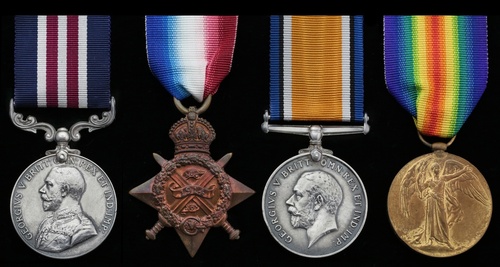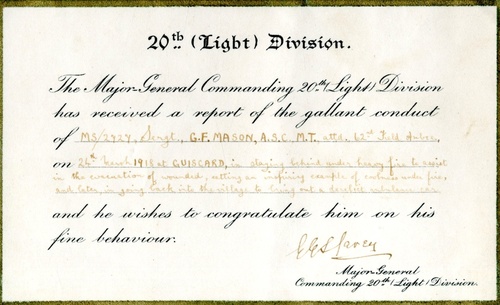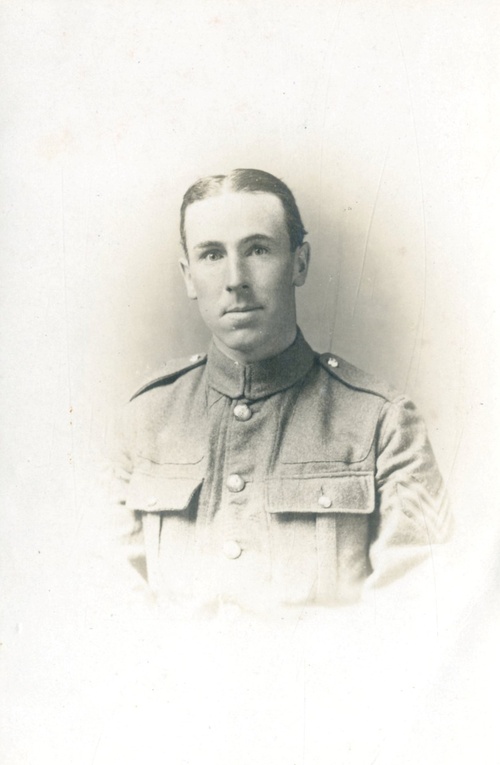Auction: 22103 - Orders, Decorations and Medals VII - e-Auction
Lot: 670
(x) '...suddenly those on the lorry found themselves in the middle of the main army retreating from Mons. Mr. Mason turned in the same direction as the troops; and the ammunition not being required he helped to pick up the wounded. The lorry was of a flat open type, and as many wounded as possible were placed upon it.'
An extract from With an Ammunition Column which gives further details on the experiences of Sergeant G. F. Mason, M.M. during the opening shots of the Great War
A well-documented 'Spring Offensive' M.M. group of four awarded to Sergeant G. F. Mason, Army Service Corps Motor Transport, attached 62nd Field Ambulance whose exploits began in August 1914 and ran until the very end of the Great War
Military Medal, G.V.R. (MS-2727 Sjt: G. F. Mason. A.S.C. ); 1914 Star (MS-2727 Pte G. F. Mason. A.S.C.); British War and Victory Medals (MS-2727 Sjt. G. F. Mason. A.S.C.), slight edge bruise to first and fourth, overall good very fine (4)
M.M. London Gazette 6 August 1918, his original citation card reads:
'24th March 1918 at Guiscard in staying behind under heavy fire to assist in the evacuation of wounded setting an inspiring example of coolness under fire, and later in going back into the village to bring out a derelict ambulance car'
George Frederick Mason was born at Newport, Monmouth in 1889, the son of Elizabeth Mason of Stockwell, London. His record notes that he had previously served as a reservist with the 26th Middlesex Volunteers. Employed by Rover Co. at their Diamler Works in Coventry prior to the outbreak of war Mason enlisted with the Army Service Corps at Avonmouth on 5 August 1914 possible and entered the war later that month on 16 August (clasp) with 4th Divisional Ammunition Column.
Given the task of supplying an artillery battery during the Battle of Mons, Mason found himself caught up in German shelling and then further entangled in the retreat from Mons. Here his ammunition lorry was turned into a temporary ambulance for the wounded men. With an Ammunition Column takes up the story:
'Mr Mason decided to drive to St. Quentin 35 miles away. The hospitals there were almost full of wounded but those on the lorry were accommodated. Another portion of the ammunition column had reached St. Quentin, and Mr. Mason was told to stay there for the night, which he did, sleeping on the lorry.
Nearly all the time Mr. Mason was in France he had to sleep on or under the lorry, as orders were received at all hours and the lorries had to be in readiness to depart. One such imperative order came next morning, for the Germans had arrived within two miles of the place, and the column had to leave for the south. With the British Army they reached the Marne, stopped at Meauz, and then hurriedly advanced. The British Army had turned. Bon Kluck had narrowly escaped disaster, and all faces- including the Germans'- were towards the north.'
Mason was invalided back to Britain on 17 October 1914 due to sickness, possibly brought on by the need to constantly sleep outside during an increasingly cold winter. Promoted Lance Corporal on 8 February 1915 Mason embarked for the front that same day. Further advanced Sergeant on 21 August 1915 his service with the A.S.C. continued and he was soon posted to 20th Divisional Supply Column on 12 April 1916. That same day he was severely reprimanded for disobedience when he was found to have a camera in his possession which he had failed to hand over to his Sergeant. Despite this he was promoted Sergeant himself on 20 April 1916 and transferred the next month to 62nd Field Ambulance. Here Mason distinguished himself with his devotion to duty, winning his M.M. during the German crossings of the Somme on 24 March 1918. Leaving France on 5 February 1919 he was discharged a month later on 7 March 1919; sold together with copied research including London Gazette, old auction listing, M.I.C. and medal roll as well as an original portrait photograph, M.M. citation card and newspaper article entitled With an ammunition column.
Subject to 5% tax on Hammer Price in addition to 20% VAT on Buyer’s Premium.
Sold for
£450
Starting price
£180











